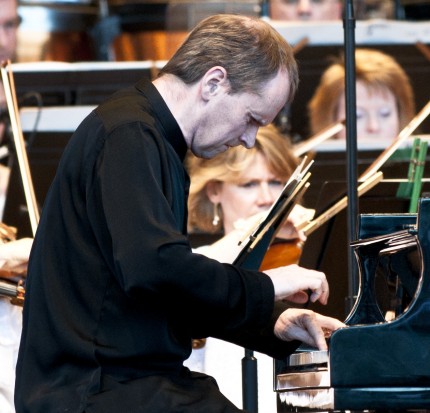Osborne and Kalmar make remarkable partners for Britten rarity

It never ceases to amaze that musical life in Chicago is so rich that even during the summer — on a weeknight, no less — you can hear a major premiere of an important yet largely unknown work such as the Britten Piano Concerto performed by a stunning pianist, also making his debut. And all for free.
The Britten Piano Concerto is a youthful work, written by the composer to perform himself as a soloist in the late 1930s. To the extent that it is known at all, it is largely due to a recording made by Sviatoslav Richter with the composer conducting.
The recording is enjoyable, to be sure, but one was unprepared for what an eye-opening experience it was to hear this piece performed live by Steven Osborne. The British pianist performed it as if it had been written for him with exquisite accompaniment provided by Carlos Kalmar and the Grant Park Orchestra.
Dressed in black with a high collar on a bright, sweltering but refreshingly wind-kissed summer evening, Osborne took a quick polite bow and then took a while to get himself adjusted on the piano bench before leaping into the opening Toccata with a contagious sense of self-assurance.
This is a work that calls for daring and an extraordinary technique, which Osborne has in spades. But what makes the tightrope walk so fascinating is its subtle musical humor. This is young Britten clearly poking fun at the more serious piano concertos of the day, Prokofiev in particular, but with a Ravelian ambience and a Stravinsky-like chamber style tied together with unbridled exuberance and a distinctively British charm.
Osborne tossed off the highly chromatic ostinati in a propulsively percussive yet musical manner that never came across as overdone and brought an almost Gershwin-like sense of jazz whimsy to the cadenza. The hints of bi-tonality in the Waltz movement and the longing of the Impromptu were crowned by a Shostakovich-meets-Stravinsky finale with its whimsical, almost pseudo-military march (a sonic precursor to Britten’s well-known World War II pacifism?).
One cannot say enough about the support provided by Kalmar and the Grant Park Orchestra. The conductor was there every step of the way throughout a deceptively complex score that is in constant motion and where precision and timing are crucial to make the work’s many effects come off. It was clear that orchestra and soloist were having a ball and the adrenaline was in overdrive with spectacular playing from all sections.
The audience knew it was experiencing something quite special, and a spontaneous standing ovation greeted the work’s conclusion that quickly spread across the park.
As if to offset the unfamiliarity of the Britten, the evening opened and closed with more familiar fare. Kalmar used a large string section for his rendition of the Mozart Jupiter Symphony No. 41, which tended to overpower the winds. There was little in the way of dynamic contrast nor tempo variations, which tended toward the stiff and stodgy side. One advantage of the slower approach was a remarkable amount of transparency in the fugue of the finale, which was the most effectively played movement of a performance that otherwise sounded somewhat under-rehearsed.
By contrast, as an opener for the evening, Kalmar and the Grant Park Orchestra offered a vibrant traversal of Richard Strauss’s Don Juan that was rich in orchestral detail and color with carefully nuanced and well-balanced playing from all sections.
The program will be repeated 6:30 p.m. Friday.
Posted in Performances

